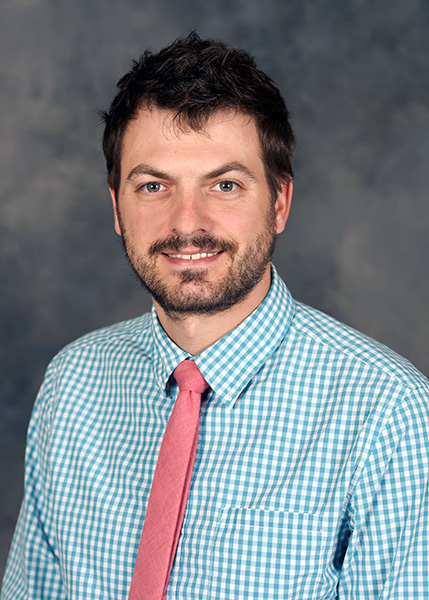- Faculty
- Robert Clines
Robert Clines

Contact Information
Email: rjclines@wcu.eduPersonal Website: https://robertclinesphd.com
Pronouns: He, Him, His
Biography
I received my Ph.D. and M.Phil. from Syracuse University, M.A. from Miami University, and B.A. from John Carroll University.<br><br>I am an interdisciplinary scholar of race, religion, and cross-cultural encounters in the premodern Mediterranean. My scholarship has been supported by the US-Italy Fulbright Commission, the Andrew W. Mellon Foundation, the University of Cambridge, the American Academy in Rome, and the Arizona Center for Medieval and Renaissance Studies.<br><br>My first book, <i>A Jewish Jesuit in the Eastern Mediterranean </i>(Cambridge University Press, 2019), explores the personal letters, official correspondence, and autobiography of Giovanni Battista Eliano (1530-1589), a Jewish-born Jesuit missionary to Eastern Christians in the Ottoman Empire. It argues that conversion from Judaism to Christianity was shaped by the belief that one’s Jewishness remained central to one’s Catholic identity, rendering conversion an evolutionary process that operated in the complex and fluid landscape of the Mediterranean.<br><br>I am currently working on a few book-length projects. The first,<i> Ancient Others: Race, Empire, and the Invention of the Italian Renaissance,</i> explores dialogues, diaries, epic and lyric poems, histories, and letters to illustrate that race thinking was central to how Italians saw the textual and physical remains of antiquity. I argue that they employed antiquity in this manner to reconcile ideologies of liberty and virtue with visions of conquest and empire that resulted in the racialization of Africans, Asians, and transalpine Europeans as inferior to Italians.<br><br>The second interrogates the intersection of race, gender, and sexual encounters in premodern epic poetry. It argues that epicists emphasized racial and sexual purity as crucial elements in the teleology of imperial hegemony, versus race-mixing and sexual deviance as threats to the stability of empire. Because the epic form aims to establish narratological authority over historical truth, I argue, its paradoxical presentation of empire as teleological yet ever precarious allows for race, gender, and sexuality to be interpretive lenses for understanding Italian visions of empire.<br><br>Lastly, along with Laura Ingallinella of the University of Toronto, I am editing an interdisciplinary collection of essays on race in premodern Italy.<br><br><b>Publications</b><br><b>Book</b><br><br><i>A Jewish Jesuit in the Eastern Mediterranean: Early Modern Conversion, Mission, and the Construction of Identity </i>(Cambridge: Cambridge University Press, 2019).<br><br><b>Essays</b><br>“The Paradoxical Colosseum: A Mesocosm for Early Modern Rome,” with Kristi Cheramie. <i>Land, Air, Sea: Environment in the Early Modern Period</i>, Jennifer Ferng and Lauren Jacobi, eds. Leiden: Brill, forthcoming.<br><br>“Dido and Laura in Carthage: White Purity, Epidermal Race, and Sexual Violence in Petrarch’s <i>Africa</i><i>.</i>” <i>postmedieval: a journal of medieval cultural studies </i>(2023). doi.org/10.1057/s41280-022-00258-8.<br><br>“The Poetics of <i>Gentilezza</i> in the <i>Fiore</i> and the Emergence of Dante’s Political Vision before the Exile,” <i>Bibliotheca </i><i>Dantesca: Journal of Dante Studies, </i>5 (2022): 94-118<i>.</i><br><br>“Edward W. Said, Renaissance Orientalism, and Imaginative Geographies of a Classical Mediterranean,” <i>Memoirs of the American Academy in Rome </i>65<i> </i>(2021), 483-535<i>. </i><br><br>“Pope as Arbiter: Schism and Sectarianism as Motivations for Eastern Rite Christians Traveling to Early Modern Rome,” in <i>A Companion to </i><i>Religious Minorities in Early Modern Rome</i>, edited by Emily Michelson and Matthew Coneys (Leiden: Brill, 2020), 55-88.<br><br>“Between hermits and heretics: Maronite Religious Renewal and the Turk in Catholic Travel Accounts of Lebanon after the Council of Trent,” in <i>Travel and Conflict in the Early Modern World</i>, edited by Gabor Gelleri and Rachel Willie (London: Routledge, 2020), 108-126.<br><br>“The Converting Sea: Religious Change and Cross-Cultural Interaction in the Early Modern Mediterranean,” <i>History Compass</i> 17:1 (January 2019), e12512.<br><br>“Wayward Leadership and the Breakdown of Reform on the Failed Jesuit Mission to the Maronites, 1577-1579,” <i>Journal of Early Modern History</i> 22:4 (Summer 2018): 215-237.<br><br>“How to Become a Jesuit Crypto-Jew: The Self-Confessionalization of Giovanni Battista Eliano through the Textual Artifice of Conversion,” <i>The Sixteenth Century Journal</i> 48:1 (Spring 2017): 3-26.<br><br>“Fighting Enemies and Finding Friends: The Cosmopolitan Pragmatism of Jesuit Residences in the Ottoman Levant,” <i>Renaissance</i> <i>Studies</i> 31:1 (February 2017): 66-86.<br><br>“Jesuit Thalassology Reconsidered: The Mediterranean Geopolitics of the Jesuit Presence in Seventeenth-Century Ethiopia,” <i>Mediterranean</i> <i>Historical</i> <i>Review</i> 31:01 (June 2016): 43-64.<br><br>“The Society of Jesus and the Early Modern Christian Orient,” <i>Jesuit Historiography Online</i> (2016).<br><br><b>Grants and Fellowships</b><br>Bogliasco Foundation Fellowship, Bogliasco, Italy<br><br>RaceB4Race Second Book Institute, Arizona Center for Medieval and Renaissance Studies<br><br>Rome Prize in Renaissance and Early Modern Studies, The American Academy in Rome<br><br>Early Modern Conversions Short-Term Residential Fellowship, Center for Research in the Arts, Social Sciences, and Humanities, University of Cambridge<br><br>Academy for Advanced Study in the Renaissance Short-Term Residential Fellowship in England and Italy, Andrew W. Mellon Foundation<br><br>Fulbright Scholarship to Italy<br><br>Fondazione Lemmermann Residential Fellowship for the Study of Roman Culture
Education
- MA, Miami University
- BA, John Carroll University
Teaching Interests
Mediterranean religion and culture; premodern race; global history; Italian humanism and literature
Research Interests
premodern critical race studies; Italian humanism and literature; the epic tradition; Mediterranean comparative history and literature